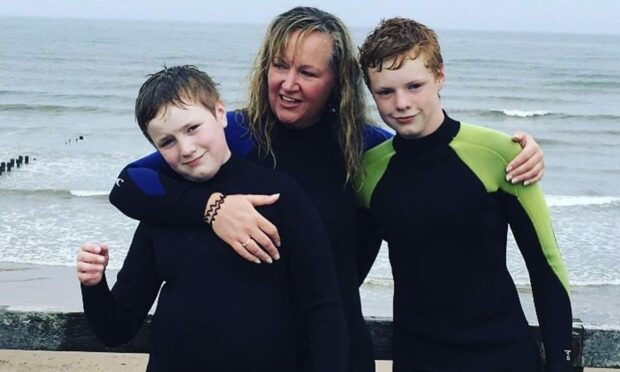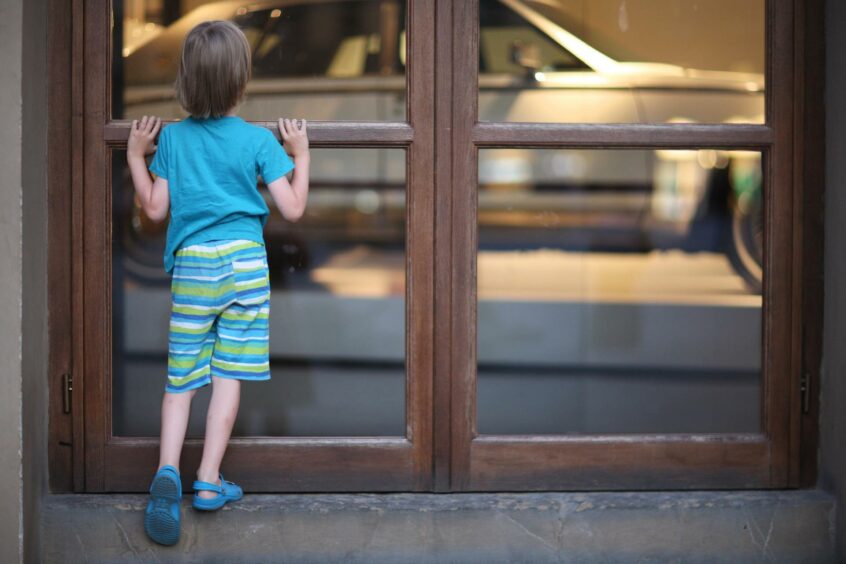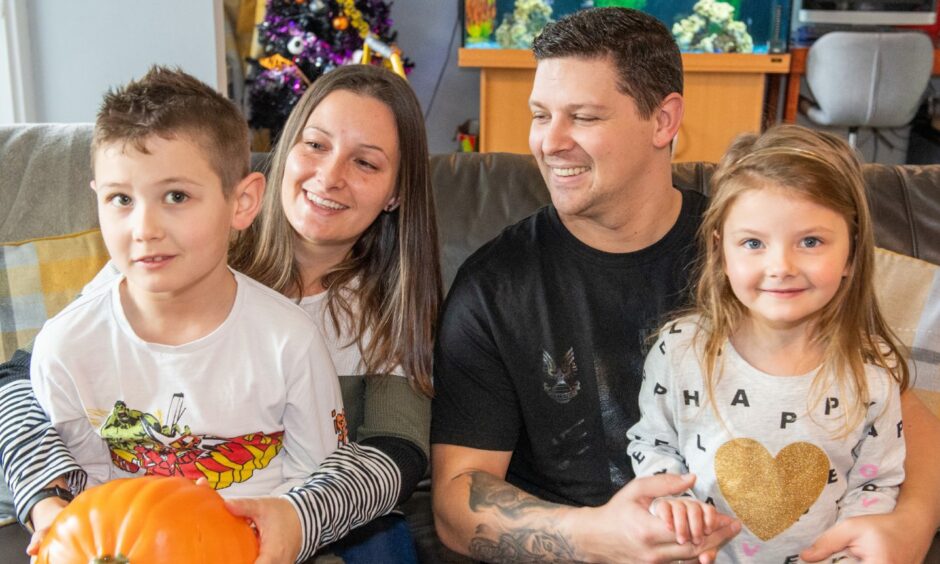Last month, Aberdeenshire parents Neil and Jade Ritchie shared their struggles to find the right support for their autistic son.
The family say they were left to “feel their way in the dark” due to a lack of joined-up autism services in the north-east.
Their story sparked a huge reaction from other Aberdeenshire parents. Many wrote to the P&J to share their own experiences, while others posted on a private support group for parents of autistic children.
The theme was consistent. Emma Morton compared autism services to “navigating a battlefield” while others said they were “dropped off a cliff” following diagnosis.
Their words are emotive, but they’re backed up by action. One mum has created a free online course, and another started her own consultancy.
Phionna McInnes reached out to tell the P&J about an enterprising charity she set up with her autistic son, Declan.
Phionna and Declan established We too! in direct response to what she calls a “diagnose and dump” mentality to north-east autism services.
Declan’s powerful words inspire drive for change
Phionna McInnes is a single mother to two autistic sons, Rogan (17) and Declan (14).
Back in 2015, Phionna was taking Rogan to an after school activity, with Declan – then seven – in the back of the car.
She recalls: “He looked at me in the rear view mirror and said ‘What about me too, Mummy? Where will you take me where people won’t stare, and you won’t cry?”
Unsurprisingly, his words struck a chord. ‘Me too’ became the starting point for what became a far-reaching support network for families in Aberdeen City and Shire.
Phionna explains: “I had been in touch with so many charities that told me I didn’t meet the criteria for their services because I was in the city and not the Shire, or vice-versa. Because I didn’t have a social work referral, or because he didn’t attend a specialist school. There were so many reasons.
“I was exhausted, overwhelmed and completely frustrated at the lack of joined-up working across the area.”
Phionna decided to take action. With £500 in savings, she managed to secure another £2,500 from Aberdeen City Council. She used this investment to create a free, ‘what’s on’ magazine listing north-east groups offering relaxed sessions in the school holidays. It also provided details of training and benefits that parents and carers may be entitled to.
The initial print run reached 6,000 people but unlocked a big demand for more. Phionna and Declan registered Me Too! as a charity and set about creating a summer holiday edition.
The ultimate aim? “To prevent other families feeling the way I did,” says Phionna.
Early autism support can prevent a crisis
Today, the charity publishes a 32-page, A5 glossy magazine for local parents of disabled children. However, what started out as a “mapping exercise” has become a mission to fill the gaps.
This wider vision is reflected in the new name, ‘We too!’. Again, Declan provided the inspiration by telling Phionna that what started as “just me” now has a much wider reach. He told his mum to turn the M upside down and make ‘me’, a ‘we’.
The charity now works directly with groups to improve accessibility. Phionna and her team of ‘ninjas’ (she prefers a light-hearted, non-corporate approach) provide training and support to help organisations run relaxed sessions. These cater to children and young people with a range of additional support needs.
To date, We too! has worked with Codonas, Jump In, Sport Aberdeen, Spectra, Innoflate, Aberdeen Art Gallery, Inverurie Panto and Scott School of Surf, to name a few. It’s the leading organisation for relaxed sessions in the north-east.
The team also runs a drop-in centre for parents and carers at Aberdeen Trinity Centre, offering a variety of groups – the Dads Lego Club on a Saturday morning is a particular hit.
Asked what she would like to see change, Phionna doesn’t hesitate. “Less replicating of the model when it comes to support services,” she says. “This would give a better selection of opportunities.
“All too often, the local authority is reactive rather than preventative. A small self-directed support budget could make a huge difference to many autistic people, rather than waiting until they hit crisis points.”
Parents’ group highlights long journey to diagnosis – and beyond
Early intervention for autism is a recurring theme across peer-to-peer support groups in the north-east.
Alison Murray founded the Facebook group “Autism and other conditions Aberdeen” (AOCA) in 2017. While Phionna has referred to a “diagnose and dump” problem in autism services, Alison highlights that diagnosis is not the beginning.
“For children, support needs to start well before diagnosis and as such can’t be restricted to autism, ” she says. “It doesn’t start at diagnosis – that can often be years down the track.”
Alison says the most common concern raised by parents on the AOCA page is the lack of educational support for autism in the north-east.
Neil and Jade Ritchie’s story sparked a lively debate on the page.
One member, Emma Morton (whose comments are printed with permission) said: “It’s like navigating a minefield. We are in the same position but with our son with ADHD. [We] self-funded loads of courses but there is zero physical support or training available in the Shire.”
Other parents described their child’s school years as a “nightmare”.
North-east councils say they offer a wide range of autism support
The P&J reached out to both Aberdeenshire and Aberdeen City councils for a response.
A spokesman for Aberdeenshire Council said it is fully committed to meeting the needs of every child and young person.
“Around 43% of our school population is recorded as receiving help with additional support needs, and that help is shaped around their unique needs and circumstances,” said the spokesman.
“Funding and resourcing around this remains consistent with previous years.”
He said the council works with schools, parents and partners to ensure children’s needs are met, in line with the principles of Getting It Right For Every Child (GIRFEC).
“Any parent who has concerns is encouraged to discuss this with their child’s school in the first instance,” he added.
Meanwhile, Aberdeen City said: “All schools can access support for children from a range of services including Autism Outreach and have access to a wide range of professional learning to support them to meet the learning needs of their pupils.
“All schools have begun training in the CIRCLE framework which guides consideration of environmental factors which may present challenges for some children and young people.
“Officers continue to work closely with Autism Understanding Scotland to conduct staff training and We Too! as a valued partner supporting delivery of holiday programmes.”
Facebook parents group grows to 1,000 members
Yet while the councils claim the support is there, many parents turn to one another for help and guidance.
The proof is in the pudding. Alison set up the AOCA page five years ago as a virtual complement to a parents’ group at Rosemount Community Centre, Aberdeen.
Since then, it’s mushroomed to support more than a thousand members.
Alison says there was little local support when she set up the group, with the National Autistic Society (NAS) having withdrawn from the area.
NAS director Rob Holland confirmed that it no longer operates in Aberdeenshire, but says its services are available nationally.
“The National Autistic Society Scotland provided advice and guidance to autistic people and their families in the Aberdeenshire area from 2012 to 2018, at which point local authority funding was discontinued,” he explains.
“However, our post-diagnostic support programme and our online social groups are open to autistic individuals across Scotland, regardless of their location. Our website also has guidance on a range of topics, and our education rights service provides advice on education entitlements and support.”
National Autistic Society calls on more services to prevent a crisis
Mr Holland agreed that there is still a great deal of work to do. In one NAS survey, 72% of respondents said they don’t get enough support to meet their needs.
“What is clear from the experiences that we’ve heard in Aberdeenshire and beyond is that autistic people and their families still struggle to get the help they need,” he said.
“We regularly hear from people fighting to the point of exhaustion and reaching a crisis point, having been passed from pillar to post between different services. Too often parents and carers must battle furiously to get the support to which they are entitled.
“That is why we are calling for a commissioner to protect and promote the rights of autistic people and people with a learning disability.”
In the meantime, many parents feel the burden lands on their own shoulders.
“We feel very strongly that we should be available for all parents, as soon as they have concerns,” says Alison. “Many are just starting their journey and wondering who to speak to.
“We always try to be clear that we are a peer support organisation, not professionals or experts. Parents often come to us feeling confused by ‘the system’ and isolated.
“The relief they feel when they hear from others who have been there too is palpable.”
More from the Schools & Family team
First Minister taking steps to address violence at Northfield
IN FULL: All the Aberdeen University graduates receiving degrees and awards on November 23
‘It’s a great satisfaction to say I made that’: How boat building project inspires Plockton pupils






Conversation